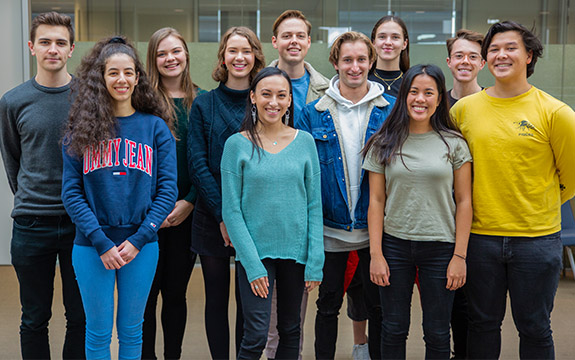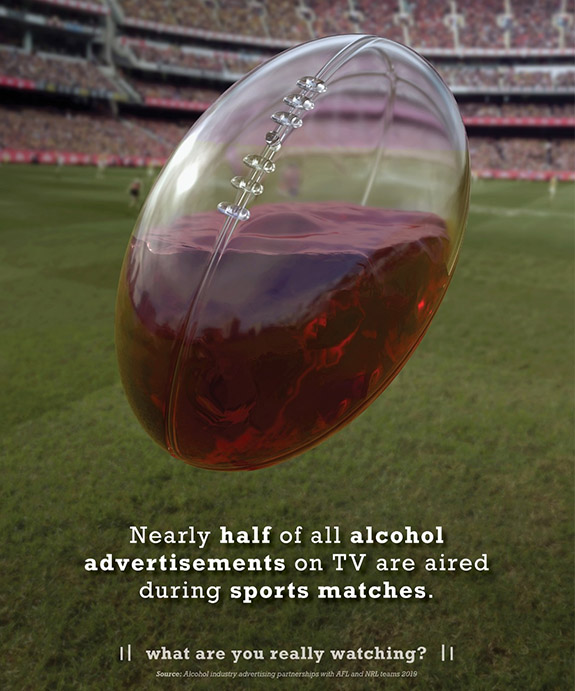Swinburne students smash Top Spin design competition

In Summary
- Swinburne students dominate Top Spin design competition
- Top Spin asks young designers to respond to tactics used by the alcohol industry
- Prizes awarded to design concepts on a weekly basis over five weeks
Swinburne students have dominated a design competition asking young Victorians to call out the sneaky tactics used by the alcohol industry.
Top Spin, a VicHealth initiative, asks those aged 18 to 29 to pick a tactic used by the alcohol industry and create a design exploring the theme.
Every week over five weeks, a major prize of $1,000 (Judges Award) is awarded to the best design, with three prizes of $300 (Judges Shout Out Award) also to be allocated.
Overall, eighty per cent of winners were Swinburne students, with Bachelor of Design (Communication Design) (Honours) students taking out three of the five major prizes available and 13 of the 15 minor prizes.
Representing the best
Felix Barnett, winner of a Judges Award says that Top Spin made him question the influence of the alcohol industry.
“Top Spin has definitely made me think differently about the alcohol industry's influence on not only young adults, but everyone,” he says.
“I was amazed to learn about the sheer number of alcohol ads in the AFL grand final last year, and it has made me realise just how much exposure alcohol advertising gets in our sports. I now understand just how thought out and targeted certain demographics are, and overall I think I am now more cynical of advertising in general.”

Felix Barnett’s winning entry asks consumers to think about the alcohol industry’s push for alcohol advertising in televised sports.
Riley van Ingen took out the Judges Award and Judges Shout Out Award. She says she hopes young people can recognise when advertising is working on them.
“I hope that young people can recognise when they are being sucked in by the alcohol industry, it is quite easy to fall for the techniques that the alcohol industry use, I was quite naïve before entering Top Spin and know idea of the extent/tactics used by the industry,” she says.
Riley van Ingen’s winning entry uses social media to make a point.
All Swinburne design students recognised with awards include:
- Riley van Ingen (Judges Award and Judges Shout Out Award)
- Felix Barnett (Judges Award)
- Alex Darbyshire (Judges Award)
- Chloe Gmehling (Judges Shout Out Award)
- Emily Wookey (Judges Shout Out Award)
- Madeleine Merzvinskis (Judges Shout Out Award)
- Sabrina Wong (Judges Shout Out Award)
- Tiger Hongmung (Judges Shout Out Award)
- Tanya Loucas (Judges Shout Out Award)
- Jesse Bucher (Judges Shout Out Award)
- Erin McConnel (Judges Shout Out Award)
Alcohol and advertising
Top Spin launched in April 2019, coinciding with the release of research from VicHealth that revealed the murky nature of alcohol promotion on social media, with a lack of disclosed sponsorship common among Australia’s top ‘influencers’.
VicHealth Acting CEO Dr Lyn Roberts said it was time to call “last drinks” on the industry’s underhanded use of social media.
“Our research shows the alcohol industry is employing tactics straight out of the playbook of Big Tobacco, using high profile influencers to make their products appear glamorous and sophisticated to young people,” Dr Roberts said.
She said while the alcohol industry wanted young people to think its products are glamourous and fun, it failed to take responsibility for the massive harm alcohol causes them.
“We know that 40 per cent of Victorians aged 18-34 drink at risky levels at least monthly. That might boost alcohol industry profits, but its bad news for the rest of us.
“Concerningly, the number of young Victorians who end up in hospital due to alcohol has increased by nearly a quarter (24 per cent) since 2009.”
Top Spin will return in 2020.

